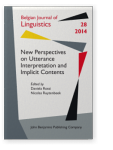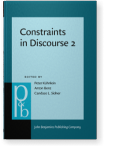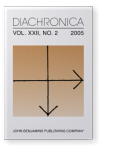Marina Terkourafi
List of John Benjamins publications for which Marina Terkourafi plays a role.
Journal
Title
Interdisciplinary Perspectives on Im/politeness
Edited by Marina Terkourafi
[AILA Applied Linguistics Series, 14] 2015. xi, 279 pp.
Subjects Applied linguistics | Language acquisition | Pragmatics | Sociolinguistics and Dialectology
Articles
2018 Tracking opinion convergence online: The effect of facial attractiveness Internet Pragmatics 1:1, pp. 88–112 | Article
We investigate whether facial attractiveness, as one source of positive/negative attitudes towards one’s conversational partner, affects the degree and type of opinion convergence online, even in the absence of physical co-presence. Our hypothesis is that when you interact with someone you find… read more
2018 Uncivil Twitter: A sociopragmatic analysis Journal of Language Aggression and Conflict 6:1, pp. 26–57 | Article
Using four tweets by Steven Salaita about the Israeli-Palestinian conflict that resulted in the retraction of his academic job offer in September 2014 as our case study, we investigate the role of Twitter in the shaping and reception of the controversial messages. Our analysis combines Gricean… read more
2015 Introduction: Bridging theory and practice in im/politeness research Interdisciplinary Perspectives on Im/politeness, Terkourafi, Marina (ed.), pp. vii–xii | Article
2015 The M-word: A Greek collocation between solidarity and insult Interdisciplinary Perspectives on Im/politeness, Terkourafi, Marina (ed.), pp. 41–70 | Article
We investigate the conventionalization of mock impoliteness through a study of the Greek collocation re malaka, which can be construed as either solidary (dude) or insulting (asshole). Questionnaire results showed that the solidary sense prevails across the board, in contrast to the insulting… read more
2014 First-order politeness in rapprochement and distancing cultures: Understandings and uses of politeness by Spanish native speakers from Spain and Spanish nonnative speakers from the U.S. Pragmatics 24:1, pp. 1–34 | Article
The close link between politeness and culture has often been highlighted, with some scholars having proposed taxonomies of cultures based on the diverse uses and conceptions of politeness. Generally, research (Hickey 2005; Ardila 2005) places Spanish-speaking cultures in the group of rapprochement… read more
2014 The importance of being indirect: A new nomenclature for indirect speech New Perspectives on Utterance Interpretation and Implicit Contents, Rossi, Daniela and Nicolas Ruytenbeek (eds.), pp. 45–70 | Article
Standard accounts of indirect speech share two assumptions: that indirect speech always has a direct alternative, and that it is strategic. I survey a number of cases that challenge one or both of these assumptions and propose a new nomenclature for indirect speech that crucially includes, in… read more
2012 Chapter 10. Between pragmatics and sociolinguistics: Where does pragmatic variation fit in? Pragmatic Variation in First and Second Language Contexts: Methodological issues, Félix-Brasdefer, J. César and Dale Koike (eds.), pp. 295–318 | Article
Among recent studies of pragmatic variation, two directions stand out. One locates variation in the distribution of pragmatic meanings across macro-social dimensions (gender, ethnicity, region) and seeks ways to study it (Schneider & Barron 2008). Another adopts a variationist methodology to… read more
2010 Conventionalized speech act formulae: From corpus findings to formalization Constraints in Discourse 2, Kühnlein, Peter, Anton Benz and Candace L. Sidner (eds.), pp. 125–140 | Article
This paper concerns the representation of formulae which conventionally encode particular illocutionary forces. Our aim is to provide an account of illocutionary force which allows the conventionalized formulae to be regarded as interpretive shortcuts. We propose an HPSG account in which the… read more
2010 Don’t go V-ing in Cypriot Greek: Semantic, pragmatic, and prosodic aspects of a prohibitive construction Grammar and interaction: New directions in constructional research, pp. 208–241 | Article
This article deals with the expression oi na+V realizing mild prohibitions in Cypriot Greek. Drawing on spoken corpus and experimental results, I propose that oi na+V simultaneously expresses two speech acts: (1) a prohibition against some act; (2) the assumption that this act is likely. In this… read more
2010 8. A critical look at the desktop metaphor 30 years on Researching and Applying Metaphor in the Real World, Low, Graham, Zazie Todd, Alice Deignan and Lynne Cameron (eds.), pp. 145–164 | Article
The Desktop Metaphor (henceforth DM) was born in the late 1970s, when members of the research group working on the Apple Lisa project used the term ‘desktop’ to define a new graphical user interface between humans and computers. We trace the evolution of this interface under the twin constraints of… read more
2009 On the loss of the masculine genitive plural in Cypriot Greek: Language contact or internal evolution? Historical Linguistics 2007: Selected papers from the 18th International Conference on Historical Linguistics, Montreal, 6–11 August 2007, Dufresne, Monique, Fernande Dupuis and Etleva Vocaj (eds.), pp. 161–174 | Article
The case system of Greek has undergone extensive changes, most notably loss of the dative and reorganisation of the genitive. The clear winner of this situation is the accusative. In this paper we investigate one more instance whereby the accusative wins out over the genitive: the loss of the… read more
2009 On de-limiting context Contexts and Constructions, Bergs, Alexander and Gabriele Diewald (eds.), pp. 17–42 | Article
2005 Understanding the present through the past: Processes of koineisation in Cyprus Diachronica 22:2, pp. 308–371 | Article
Studies of Greek as spoken today in Cyprus draw attention to a generalised variety of Cypriot Greek, free from local variation within the island, yet diverging in several ways from the standard spoken on the mainland. In this article, I attempt first to classify this variety, examining whether it… read more
2005 An argument for a frame-based approach to politeness: Evidence from the use of the imperative in Cypriot Greek Broadening the Horizon of Linguistic Politeness, Lakoff, Robin T. and Sachiko Ide (eds.), pp. 99–116 | Article
2005 Identity and semantic change: Aspects of T/V usage in Cyprus The Evolution of Pragmatic Markers, Mosegaard Hansen, Maj-Britt and Corinne Rossari (eds.), pp. 283–306 | Article
The quantitative and qualitative analysis of spontaneous conversational data reveals that T/V usage in Cypriot Greek (CG) is realised sometimes as a code-switch into Standard Modern Greek (SMG), and sometimes as an integral part of the Cypriot code. Moreover, a consideration of the interactional… read more
2003 Generalised and particularised implicatures of linguistic politeness Perspectives on Dialogue in the New Millennium, Kühnlein, Peter, Hannes Rieser and Henk Zeevat (eds.), pp. 149–164 | Article
1999 Frames for politeness: A case study Ideologies of politeness, Kienpointner, Manfred (ed.), pp. 97–117 | Article
















